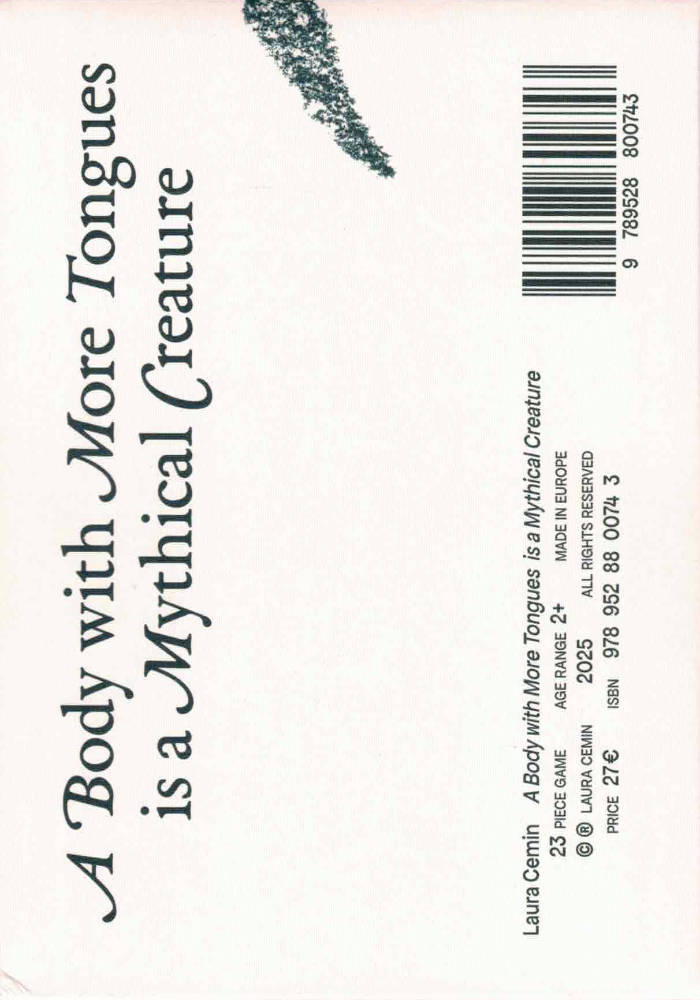

recommendations

DRINK DEEPLY AND DREAM
Drink Deeply and Dream by Elspeth Walker is an ethereal, offbeat short story about wannabe vampires with a Marxist bent and their search for salvation from capitalism via eternal bloodlust.
Paperback, Staple Bound and Offset Printed

A Body with More Tongues is a Mythical Creature
A Body with More Tongues is a Mythical Creature is a small publication accompanied by a set of playing cards. It builds upon Paper Notes and Pinecones, a solo exhibition I presented in May 2024 at HAM Gallery, Helsinki, and marks the culmination of my research into how living in a foreign country reshapes the way we move and physically relate to the world around us.
Contributors: Chen Nadler, Daniela Pascual, Francesca Berti, Giorgio Convertito, Giorgia Lolli, Isabella Covertino, Tashi Iwaoka, and others
Edited by: M. Winter
Music by: Jenny Berger Myhre
Illustrations by: Valentina Černiauskaitė
Design by: Ran-Re Reimann
Supported by: Kone Foundation, Nordic Culture Point, and the Finnish Art Society

Exercises of Poetic Communication with Other Aesthetic Operators
Ernesto de Sousa (1921–1988) was a major and multifaceted figure from the Portuguese avant-garde—artist, poet, critic, essayist, curator, editor, filmmaker, and a promoter of experimental ideas and artistic expressions.
Reflecting questions of hierarchy, authorship, and the complexity of framing or dividing within the multiple and complementary practices of Ernesto de Sousa—whose motto “Your Body is My Body, My Body is Your Body” serves as a poetic manifesto—this publication explores the various aspects of his oeuvre (visual, poetical, and theoretical) and his outstanding inventiveness of concepts.
The volume brings together a selection of works, unpublished archives and their translations, and theoretical texts by Ernesto de Sousa, including the first complete translation in English of «Orality, the future of art?» (1968). Richly illustrated, the book reunites an introductory text by Lilou Vidal, two new essays by Paula Parente Pinto and by José Miranda Justo along with a text by Hugo Canoilas.
"There was a time when bread was sacred; and in a general sense, all fabricated objects deserved the respect that resulted from (for the conscience of those who used them) concretely diving into their own motivations. Human gestures, like aesthetic objects, were inseparable from their relevant functions. Naturalism prompted us to look at natural and fabricated objects with a vision that was cosmic and indifferent at the same time. The objects, today, object. In the future, objects and gestures will perhaps clothe themselves once again in their lost dignity. The word love, a bit of bread, the letter A will stop being mortal accidents of daily life. Desacralized, they will once again be as decisive as the tiniest brushstroke the painter made on his canvas. And each of these brushstrokes will reveal the structure of the world. Life can then be compared to a vast work of art. Everything will be absolutely aesthetic.."
— Ernesto de Sousa
Contributors: Hugo Canoilas, Ernesto de Sousa, Tobi Maier, José Miranda Justo, Paula Parente Pinto, Lilou Vidal

Writing Out Loud
Writing Out Loud is a publication that brings together the transcriptions of eight lectures by the artist Jon Mikel Euba that were live translated from Spanish to English during the course Action unites, words divide (On praxis, an unstated theory) at the DAI. The lectures were delivered across the academic year 2014 – 2015 at the invitation of If I Can’t Dance. They sit within a larger writing-centred project by the artist that he has pursued for almost a decade, through which he aims to define a form of praxis that could evolve into a technical theory.

Slant Nr. 1
Slant is a mail art project and a publishing house. It invites artists, designers, writers and poets to express themselves through a common theme every two weeks. it has poetry as its beacon of reflection, keeping in mind that sometimes we must tell the truth slant in order to see our reality depicted.
First edition, approx. 240pp. 4-colors riso printed.
20 x 25,5cm, 200 copies. Coptic hand-made binding.
Softcover printed wraps. French and English texts.

KAMERA CAHIER N° 9
Peter Downsbrough (New Jersey, US, 1940) lives and works in Brussels (Belgium). Associated with major international art movements such as minimal art, conceptual art, and visual poetry, his work spans across various mediums including sculpture, wall pieces and room pieces, books, work on paper, photography, film, and video. The work, which has affinities with architecture and typography, explores the traditional use of space and language, while criticizing power structures, e.g. urbanism, that influence social interactions and shape the landscape.
A special edition issue curated, designed and published by AVARIE, Paris and Labor Neunzehn, Berlin. It accompanies KAMERA SERIES, while it is an independent and valuable object to collect.
The central idea that informs and directs the booklets’ montage is the interplay between the concepts of addition and subtraction. This is achieved by unveiling a missing image in the screening or an unreleased second from an artist's film, expanded to 24 pages. Additionally, each booklet contains a piece directly removed from the show.
The editing establishes a dialogue between film frames and performed writings derived from texts, scripts, storyboards, and notes. The KAMERA exhibition is consequently extended into a physical space—the book—allowing for its widespread dissemination, complementing and contrasting with its potential online occurrence.
KAMERA SERIES is a screening program of experimental films, video art works and printed matter taking place in a former GDR building in Berlin. Each event showcases a retrospective of selected films by an artist and a small exhibition of his/her publications or works on paper over a span of 4 days.